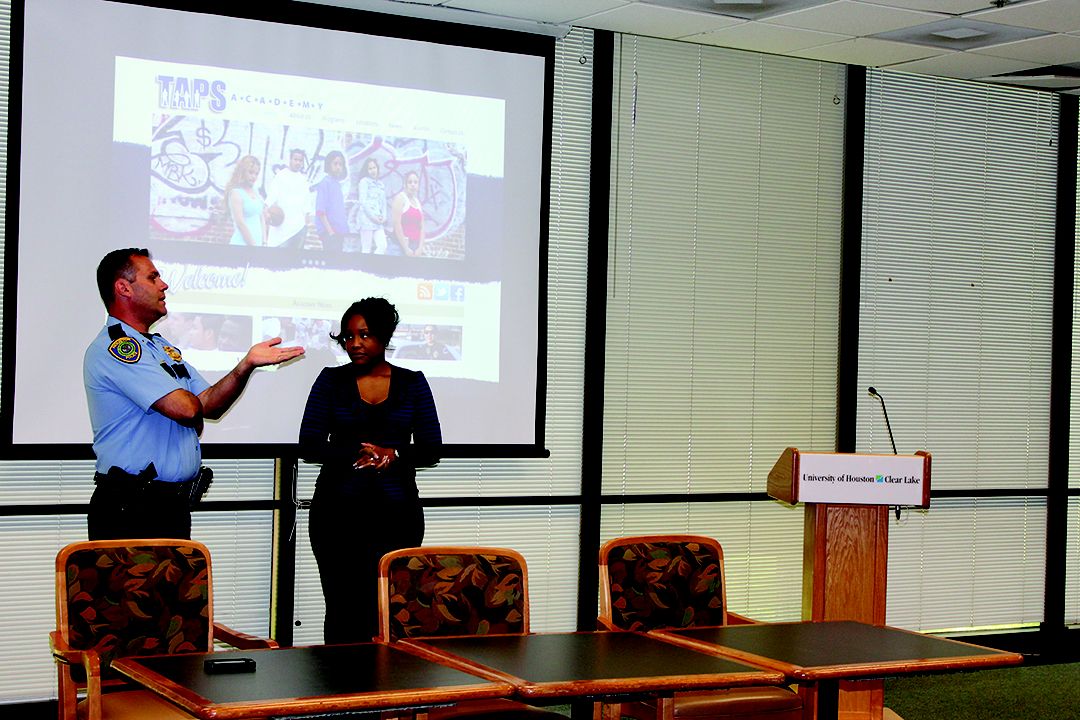Program unites youth and law enforcement
KELSEY CIABATTONI
THE SIGNAL
Knowledge is indeed power. At least that’s the message that Professor of Criminology Everette Penn and the Teen and Police Service Academy (TAPS) is trying to convey to the city of Houston’s at-risk youth as they work to bridge the social gap between teens and law enforcement by addressing the issues that directly impact the youth and the communities in which they live.
TAPS, established in fall 2011, is an 11-week program co-founded by Penn and Brian Lumpkin, a UHCL alumnus and now retired assistant police chief for the Houston Police Department. The program was funded from a Department of Justice office grant that was given to the most creative response stemming from a challenge by Houston Police Department Chief Charles McClelland, Jr., who asked his staff to find ways to reach the most at-risk youth.
Lieutenant Anthony Turner, who is currently in his second year with TAPS, was a previous student of Penn’s and was present to see the beginning stages of the program. Turner said witnessing the program in its infancy contributed to his decision to get involved with the program, but he primarily wanted to show the kids that he could identify with them on a more personal level than another officer might.
“I wanted to be able to tell the kids that just because I wear this uniform, I’m still the same as you,” Turner said. “I listen to the same music, and I grew up in the same social and economic background. If they can make the right decisions now, they can change their future.”
The program works with students who have repeatedly been suspended or expelled for reasons such as truancy or discipline infractions. It provides a way for HPD officers to help TAPS students see authority differently and to help them gain valuable insight about each other and the issues they face on a daily basis.
“I believe the relationship between theory and practice should be strong and a learning experience for students,” Penn said.
The program is also serving to help HPD better understand the students and their actions. This objective is being accomplished through learning about topics such as gang membership, anger management, bullying and dating violence. It provides interaction and discussion between the students and the law enforcement personnel who serve their communities.
Meetings are primarily held at Beechnut Academy, which is a part of the Houston Independent School District, but the local program has branched out to include Youth Village in Seabrook and Burnett-Bayland Rehabilitation Center (BBRC) in Houston.
UHCL alumnus Lieutenant Jason Giuffre has been part of TAPS since its second class and represents Youth Village in Seabrook and BBRC. He says that one of his principal goals of the program is to see the students through the 18-24 year-old age gap, where the city of Houston sees the most problems.
“There’s a little bit of hope that we try to instill that it’s not all lost yet,” Giuffre said. “The goal is to take them from this ‘at-risk kid’ to a ‘with promise teen’ and really just to race them through this time period that is really tough to turn back from.”
Sergeant Tracey Richardson, who represents the North Patrol division, said her biggest goal was to try to teach the kids that “a little crime leads to a big crime, which leads to jail.”
“The biggest issue was to get them to understand that right now you’re just smoking a cigarette, and you’re not even old enough to smoke a cigarette,” she said. “In three years, you’ll be smoking marijuana, and you’ll never be old enough to smoke that because it’s not legal in Texas. So when we talk to them one-on-one we have to explain to them why we’re worried about this little crime right now and then remind them that one day they’re going to be the adult in a position to be a positive example for other children.”
Penn, who also serves as UHCL department chair of social and cultural studies, brought 19 TAPS students to participate in the university’s 20th annual Student Conference for Research and Creative Arts Tuesday, April 15. At the conference, the TAPS students presented how their views of law enforcement have changed since the beginning of the program.
One TAPS student (TAPS students’ names are being withheld because they are minors) said he has a better understanding of what law enforcement does on a daily basis, and most of the time they actually are just trying to help.
“For me personally, I realize now that the problems really do start out small,” another TAPS student said. “I started off being late to school, then I would skip one class, then I would skip the whole day.”
The foundation behind TAPS has not gone unnoticed and has already expanded to five cities, including Puerto Rico, Miami, Tampa, British Columbia and Columbus.

